Co-Founder and Owner of Sicily’s First Didactic Agriturismo
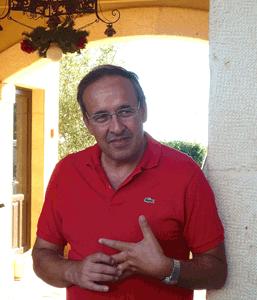
Michele Lirosi
photo by Lucy Gordan
Interview ©2012
During the months of October and November the Department of Agriculture and Rural Development of the Region of Sicily organized five week-long press trips to different predominantly rural sections of “Persephone’s Island.” Our Rome correspondent Lucy Gordan participated in the second one which took us to Mazzairino, Caltagirone, Acireale, Viagrande, Mount Etna, and Castiglione di Sicilia. She stayed in three very comfortable agriturismi: Casa Canalotto near Mazzarino (Caltanisetta), Il Casale delle Rose just outside Caltagirone, where she interviewed Michele Lirosi, and Agriturismo dell’Etna in Riposto (Catania) .
What are your first memories of food?
ML: My first memories of food are all connected to what we cultivate here at “Il Casale delle Rose,” where my brother and partner Francesco and I grew up, and to my paternal grandmother’s unique touches to traditional Sicilian dishes like her pasta al forno. I don’t have to tell you that each region of Sicily has its own cuisine and my grandmother’s was variations on the theme of dishes from our region of Catania. For example, she sprinkled cinnamon on the top layer of her pasta al forno. The smell of cinnamon permeated the whole kitchen.
When your parents married and your mother came to live here with her parents-in-law, did your father compliment her on her cooking or did he always prefer his mother’s cooking?
ML: My mother is a very good cook, but she became so thanks to her mother-in-law’s recipes.
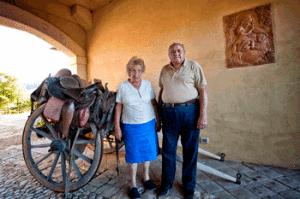
Michele Lirosi’s parents, photo © Claudio Brufola
Do you still have some of your grandmother’s recipes?
ML: Yes, she wrote many of them down. I’m in the process of preparing them for a cookbook I want to publish. One recipe in particular is truly delicious. It’s a sweet called testa di turco. It’s a bigné.
How did it get the name: “head of a Turk”?
ML: Probably because the sweet was originally Turkish. You know that Sicilian cuisine is heavily influenced by its foreign invaders of the distant and not too distant past: the Greeks, Arabs, Normans, Germans, and Spaniards.
One of your responsibilities here at Casale delle Rose is to oversee the kitchen with your mother. In addition to your grandmother’s recipes, does your mother have a special recipe?
ML: Yes, of course. One of our country’s original peasant dishes, which is now a delicacy, is snails. It’s a local delicacy, typical of Caltagirone, so it’s called le lumache alla Caltagironese which are snails baked in the oven with onions and tomatoes.
Were you and Francesco born here at Casale delle Rose?
ML: No, our home is in the center of Caltagirone, but we lived here during school vacations and every summer.
When did it become an agriturismo?
ML: In 2001. The decision was my brother’s and mine, but our parents strongly supported the idea. My brother’s responsibility is organizing and carrying out our activities for the handicapped. It’s a didactic agriturismo because we want to transmit to the next generations the traditions and essence of the Sicilian countryside. Many school groups come here for the day. For them, but also for our house guests, we demonstrate how to milk our cows, goats, and sheep; how to make cheese; and explain all aspects of how we make our wines.
Who is the oldest of the two of you?
ML: I am by five years.
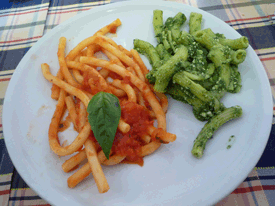
Bucatini pasta, iphoto ©2012 by Lucy Gordan
What was your favorite dish of your grandmother?
ML: I love pasta so of all the delicious things that my grandmother made I particularly loved her primi piatti especially the typically Sicilian bucatini which you ate today at lunch.
What is your favorite dish of your mother?
ML: My mother comes from the town of Grammichele well-known for a sweet like a Napoleon filled with ricotta.
How many children do you and your brother have?
ML: I have a son and a daughter. My brother has two daughters. My nieces are still children, but my children are grown and, like me, very attached to this place and its family history so I’m sure they’ll follow in my footsteps. We’re an old-fashioned very united family.
How often do you tell your wife that your grandmother and your mother are better cooks than she is?
ML: Often, perhaps too often, but she is a good cook too especially her sweets. Being a good cook is in our DNA. I really care about the quality of the food I eat and serve to my guests. I care that the food I give my guests comes from my heart. For example, grapes have to taste like grapes. Our grapes are not pumped up; they are organic. We don’t stress our soil or our products: fruits and vegetables. They have to be genuine, reflect their surroundings.
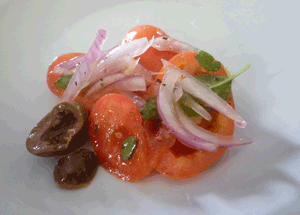
How do you and your mother divide your responsibilities in the kitchen?
ML: My mother is elderly; she oversees the kitchen, but the main responsibility is our chef’s and mine. However, my mother makes sure that we stay on course and maintain our local culinary traditions.
What do you like best about your work?
ML: To promote Sicilian cuisine and traditions.
What do you like least?
ML: The long hours, 24 hours a day every day of the year.
Up until now we have talked about your profession, but my readers and I would like to know more about Michele Lirosi the person. For example, your favorite dish, what you like to eat on your birthday?
ML: I shouldn’t tell you because we don’t have it here on the farm, but I love fish.
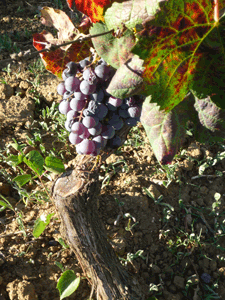
photo © 2012 by Lucy Gordan
Your favorite wines?
ML: My favorite wines are the ones I produce, particularly those made from Nerello Mascalese and Nero d’Avola. I also like Syrah.
Sicily is famous for its sorbets and sweets; what are your favorites?
ML: My favorite is a Christmas sweet from here, Caltagirone. It’s called la collorella di Caltagirone. It’s sweetened with honey, preferably with zagara d’arancio. It has a rondella shape made of very very thin Napoleon pastry and filled with toasted almonds and honey. Its filling can also be made of almonds toasted with vin brulé or vino cotto in Italian. All the women in the family came together and still do to make this sweet. It’s decorated with little sugar balls of different colors and little pinches on the pastry.
A dish you don’t like?
ML: I don’t like game. I don’t say I don’t like something for the sake of saying it. I taste everything and then I feel free to say that I don’t like something.
If you were on death-row, what would you order for your last meal?
ML: A plate of homemade pasta with raw tomato sauce which has been left to marinate for at least three hours in olive oil, crushed garlic, hand-cut basil, hot red peppers and salt. After you drain the pasta you flip it around in a pan with this sauce and add grated salted ricotta cheese and strips of fried eggplants.
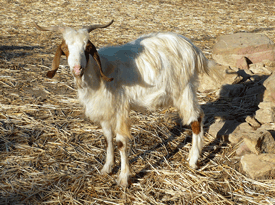
photo ©2012 by Lucy Gordan
You are deeply rooted to this place; is that why you decided to open it as an
agriturismo? What type of job did you do before 2001?
ML: Several different jobs. I still do other administrative jobs in Caltagirone in the public sector, but the most important is running Il Casale delle Rose and increasing my love for it. My other jobs have nothing to do with politics; they are not political appointments.
I started studying medicine, but stopped. Instead my brother recently went back to finish his university degree in economics and sociology.
How do you find the time and the energy to run the kitchen, the guest rooms, the farm at Casale delle Rose?
ML: You should ask this question of my employees because some people say I’m nuts, sick in the head. They don’t understand where I find all this energy. My energy comes from only one source: my passion. When I occasionally stop to think, I realize that I’m sacrificing a lot. My dedication is enormous and my satisfactions are more moralistic than profitable.
You told me that you love to travel — Where?
ML: In Europe: in continental Italy, in Sardinia, and in France. I’ve traveled extensively in France and I like many of its regions, not one in particular.
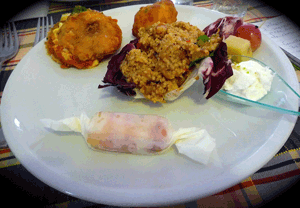
photo ©2012 by Lucy Gordan
When you travel, what do you miss most about Il Casale delle Rose?
ML: During the first few days, nothing. But after a few days I can’t wait to come home because I miss the aromas, because my love for and my unconscious attachment to this place pull me back like tides.
In Sicily, where I was born (Caltagirone is the heart of Sicily—at the geographic center), many of us don’t realize that we have the great good fortune to live in a paradise thanks to the quality of life and the enormous variety of its unique and unmistakable foods for their colors, taste, and quality. All 365 days of the year we can enjoy a truly special climate, which is reflected in the quality of our food products. I understand how lucky I am to live here because I know the territory and its soil, I eat and use both cultivated products and those that grow wild.
If I understand correctly, if you had not chosen to run this agriturismo, you would have become a doctor?
ML: No, I didn’t become a doctor because I met my wife; we fell in love, started a family, and I quit studying medicine. We had this piece of property; its buildings needed renovations, but its soil produces anything you plant here. It would have been a shame after all the sacrifices my parents had made to maintain this land to abandon or sell it. So my brother and I together with my parents thought we should let others enjoy what we loved so much, so we began to renovate its buildings and transform them into guestrooms. I’m a person who needs to be busy 24 hours a day. I need to create things. Besides running the agriturismo I make homemade beer, developed a breed of Sicilian hens, go hunting with my hunting dogs, follow our cuisine. I’m a Pisces. My wife is Aquarius.
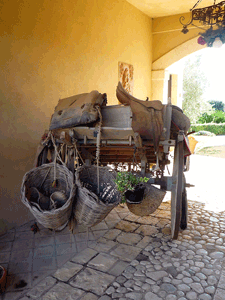
photo ©2012 by Lucy Gordan
& & &
Lucy Gordan is an award-winning travel writer and cultural journalist living in Rome, where she is Epicurean-Traveler.com’s Bureau Chief. She can be reached at
gordan@attglobal.net. Her website is www.lucygordan.com.
